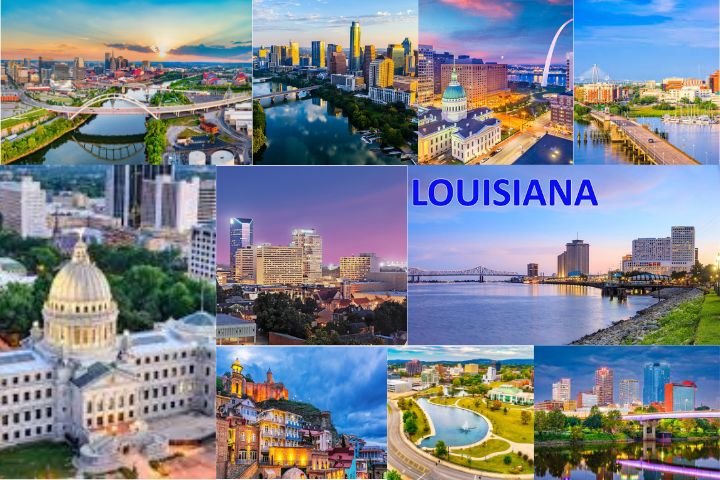Racism in the United States is a deep-rooted issue that continues to affect millions of people across the country. Understanding which states are the most racist in the US can provide valuable insight into the ongoing struggle against racial prejudice. From systemic discrimination to the lingering effects of segregation, some states still struggle more than others with addressing racial disparities in US states with the most racism. In this article, we’ll take a closer look at the top 10 most racist states in the US and explore how these issues persist, why they matter, and what can be done to create a more inclusive society. Let’s dive in and see how each state measures up when it comes to racial inequality.
Understanding Racism in the US
Racism in the US is a big issue. It’s something that affects many people every day. Some states have more problems with racial prejudice than others. This is due to segregation, discrimination, and inequality.
When we talk about the most racist states in the US, we are looking at places where these issues are stronger. These problems are not just in the past—they still happen now. Understanding where these issues are the worst helps us see how we can make things better.
Criteria for Ranking the Most Racist States
To find the top 10 most racist states in the US, we use several key factors. These factors help show where racial issues are the worst.
We look at hate crime statistics. This shows how often crimes are committed out of racial hatred. Next, we consider segregation. If different races live in separate areas, it can lead to more inequality.
We also check income and education gaps. A big difference between races in these areas points to racism. Lastly, healthcare access is important. If one group has worse healthcare, it’s often linked to racism.
These factors help us rank the states by how much racism they have. It’s not just about opinions, but real facts that show where problems are most severe.
Top 10 Most Racist States in the US
When it comes to racism in the US, certain states stand out due to deep-rooted racial prejudice, systemic discrimination, and significant disparities that continue to affect people of color. The top 10 most racist states in the US are places where racial issues are still highly visible, often affecting economic opportunities, education, healthcare, and social dynamics. Let’s take a look at each of these states and explore the factors that contribute to their rankings.
1. Mississippi

Mississippi has a long history of racial prejudice, which still lingers today. The state has some of the highest racial disparities in education, healthcare, and income. Despite improvements over the years, segregation is still widespread, especially in schools and neighborhoods. The state also faces a high rate of hate crimes, and incidents of racial violence and discrimination remain a major issue. The historical legacy of slavery and segregation continues to shape many of the challenges that Black residents face.
2. Alabama

Alabama, another state with a painful history of racism, still struggles with deep racial divisions. From segregated schools to unequal job opportunities, Black residents continue to experience systemic racism in various aspects of life. Hate crimes and racial violence have also been significant issues in the state, along with disparities in income and healthcare access. The legacy of the Civil Rights Movement is ever-present, with many areas still feeling the effects of past racial inequalities.
3. Louisiana

Louisiana ranks high among the most racist states in the US, with significant racial divides in education, employment, and healthcare. Black residents face major challenges, especially in terms of income inequality and access to quality education. Racial prejudice is also prevalent in the criminal justice system, where Black individuals are disproportionately affected by incarceration rates. Additionally, hate crimes and racial violence continue to impact communities in the state.
4. Georgia

Georgia is a state that, while known for its historical significance in the Civil Rights Movement, still grapples with racial tensions. The state has high rates of racial segregation, particularly in schools and housing. Economic inequality is evident, with Black families often earning significantly less than their white counterparts. Discrimination in employment and healthcare is also widespread, and incidents of racial violence and hate crimes are far from rare.
5. South Carolina

South Carolina’s history of racial tension continues to influence its present-day reality. Despite significant progress, racial divides in education and income levels remain stark. Segregation still affects many communities, and Black residents face systemic barriers to equal opportunities. Hate crimes and racial violence are issues that continue to plague the state, leaving many feeling marginalized and vulnerable.
6. Arkansas

In Arkansas, racial prejudice is still a significant problem, particularly in rural areas. The state struggles with racial segregation in schools and neighborhoods, leading to a lack of economic and educational opportunities for Black residents. Disparities in healthcare access, along with high rates of poverty in Black communities, further highlight the racial inequalities present in the state. Hate crimes are also a concern, with incidents of racial violence continuing to surface.
7. Tennessee

Tennessee, like many other Southern states, has a complex racial history that still affects its residents today. Despite progress, racial disparities in income, education, and healthcare are prevalent. Black residents often face discrimination in the job market and struggle with limited access to quality healthcare. Hate crimes, particularly against Black individuals, remain a significant issue in the state.
8. Kentucky

Kentucky’s racial issues are often hidden beneath the surface, but they are no less significant. The state has high levels of segregation in schools and housing, and Black residents face systemic discrimination in education, employment, and healthcare. The wealth gap between Black and white families is substantial, and racial prejudice continues to affect everyday life in many parts of the state.
9. Missouri

Missouri struggles with a combination of racial segregation, economic inequality, and a history of racial violence. Black residents in the state face higher rates of unemployment, lower wages, and limited access to quality healthcare. The state’s education system remains racially divided, and incidents of hate crimes and racial violence persist, particularly in urban areas like St. Louis and Ferguson.
10. Texas

Texas, despite its large and diverse population, has some of the highest racial disparities in the country. While there are significant strides in some areas, Black and Hispanic residents still face challenges in terms of education, income, and healthcare access. Racial segregation is still evident in schools and housing, and hate crimes, particularly against Black and Latino communities, continue to be a major issue in the state.
Effects of Racism in American States
Racism hurts people in many ways. In the most racist states in the US, it’s not just about hate crimes. It affects jobs, education, and healthcare too. People of color often have less access to good schools, good jobs, and healthcare. This keeps them stuck in poverty and unhealthy conditions. In these states, the fear of racial violence is real, and it wears people down. The effects of racism are felt every day, making it hard for many to succeed. We need to see these problems and work together to fix them.
Addressing Racial Issues: What Can Be Done?
Racism is a big issue, especially in the most racist states in the US. But we can change things. It starts with learning about the problem. We need to teach the truth about racial discrimination in schools. Laws must change to protect everyone. States with the most racism need stronger rules to stop hate and unfair treatment. We can also work together in our communities to help one another. By voting for better policies, supporting each other, and learning more, we can fight racism and make a better future for everyone.
Conclusion
Racism in the top 10 most racist states in the US is still a major problem. It affects many aspects of life, like jobs, education, and healthcare. The impact of racial prejudice is clear, and it’s not just something from the past. But we can make a change. By learning more, supporting better laws, and standing together, we can fight racism. Everyone deserves a fair chance, and together, we can work toward a future without discrimination.

